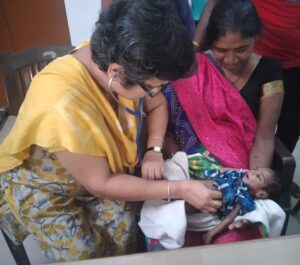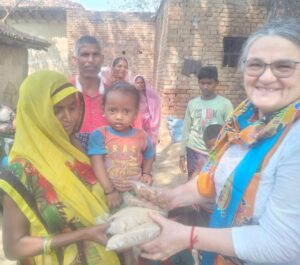The G.A.N.E.S.H. Project's Community
India has the world’s largest birth ratio (about 26 million per year). With a population of more than 199 million, Uttar Pradesh is the most populous state in India. Lack of antenatal care, unsafe child births, under nourishment and lack of access to healthcare infrastructure are among the main risk factors for maternal and child morbidity and mortality.
Neurological and developmental disorders and disabilities in particular compromise the attainment of full Neurological and developmental disorders and disabilities in particular compromise the attainment of full social and economic potential at family and community levels. In other words, almost one in 11 children has at least one of the following impairments: neuromuscular disorders and cerebral palsy, epilepsy, intellectual disability, speech and language disorders, hearing and/or vision impairment or autism.
The General Movement Assessment (GMA) is regarded as the best clinical tool to predict cerebral palsy in infants <5 months. In addition, children with developmental delay, intellectual disabilities, late detected genetic disorders or autism spectrum disorder show abnormal general movements (GMs) during infancy. General Movement Assessment in Neonates for Early Identification and Intervention, Social Support and Health Awareness (G.A.N.E.S.H.) aims and to provide evidence as to whether community health workers can support the identification of infants at high- risk for neurological and developmental disorders, disabilities, and to monitor further development in those infants and to initiate early and targeted intervention procedures.
Apart from low birth weight (<2500 g) and preterm birth (<37 weeks’ gestation), non-institutional delivery, a history of perinatal asphyxia (delayed cry and difficult breathing at birth), neonatal illness requiring hospitalization, postnatal brain infections and stunting are significantly associated with neurological and developmental disorders and disabilities. Several of these risk factors could be averted through public health intervention. There is strong evidence that early intervention improves functional outcomes for infants with neurological and developmental disorders and is economically cost- effective as it reduces the rate and severity of later impairments. However, low-income communities, which are most vulnerable to neurological and developmental disorders, often lack programmes for early identification and intervention.
The G.A.N.E.S.H. project is perceived by the communities as part of the ongoing services, which have been provided by KIRAN Society. This project is implemented in 54 (cluster of) villages in 3 blocks of two districts of Uttar Pradesh, where the burden of poverty and undernutrition is particularly high. More than 90% of newborn infants are brought to the free services in the primary health centers or the community health workers are welcomed at the family home. As part of the Indian culture, after having given birth, young mothers may move to the grandmother’s home, possibly in another district.
The KIRAN staff with the support of community health workers, they are using mobile tools to pursue a broad range of health education goals including subjects such as vaccination, nutrition, hygiene and sanitation, but most importantly, they provide regular personal care and door to door services in their communities. In addition, the most socio-economically disadvantaged families (especially pregnant women and lactating mothers, infants and young children) in terms of food supplements containing vitamins, iron and calcium.
This project has brought a ray of hope to their families benefitting many children.


